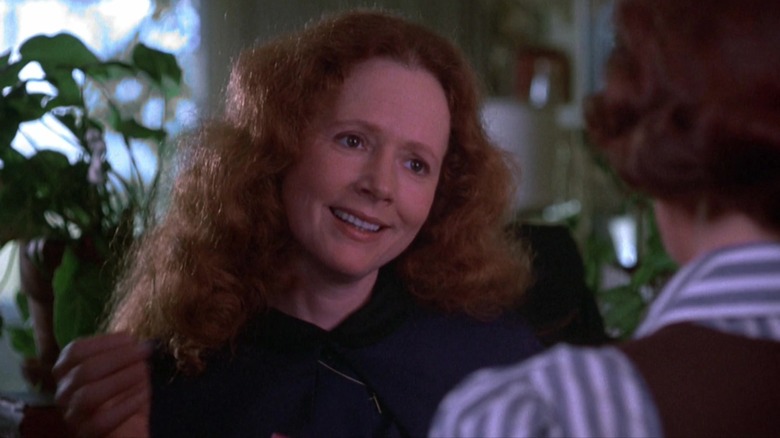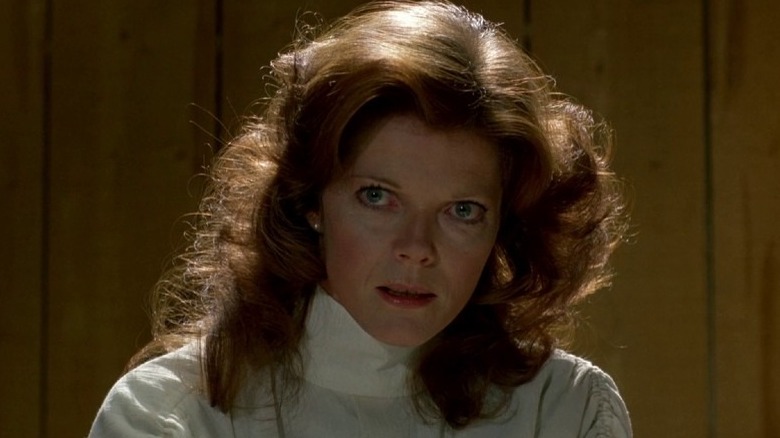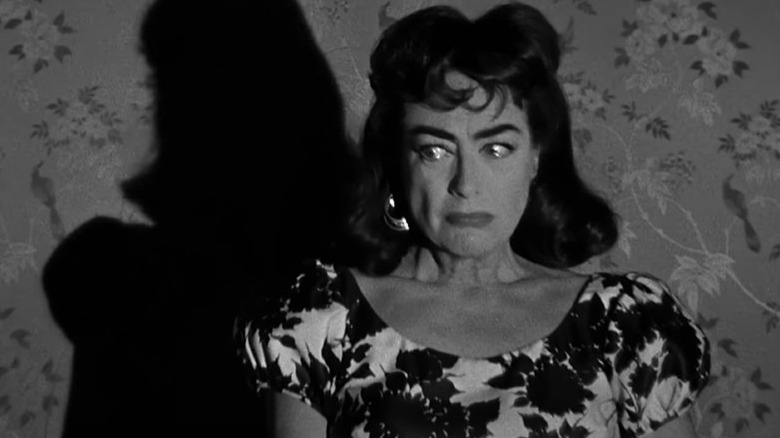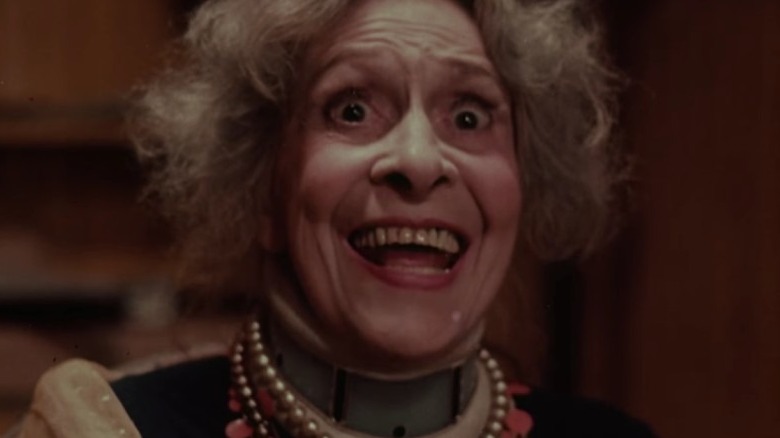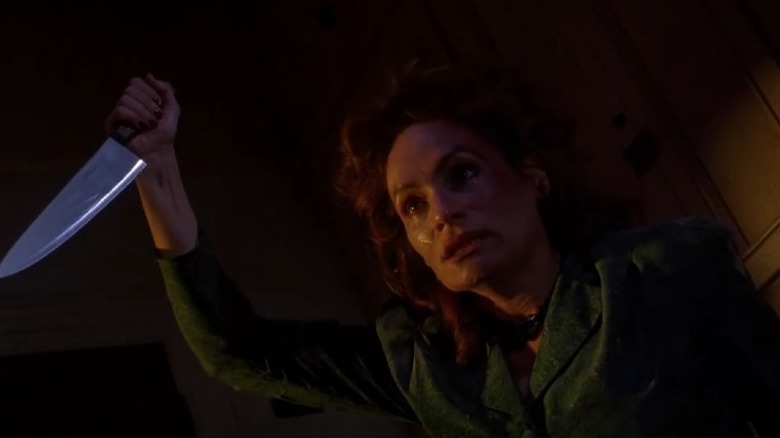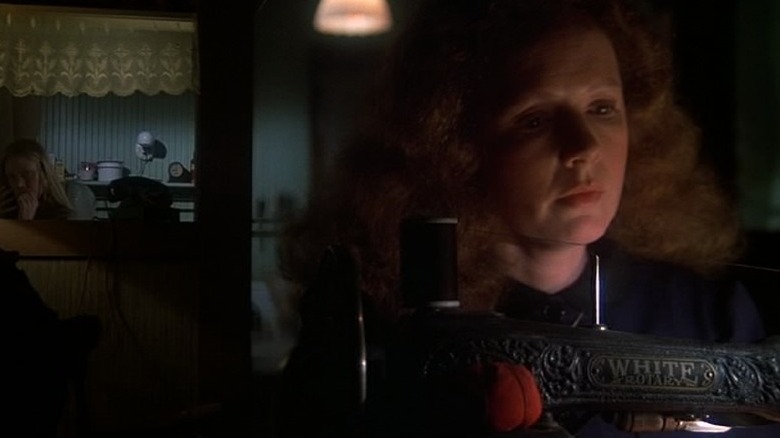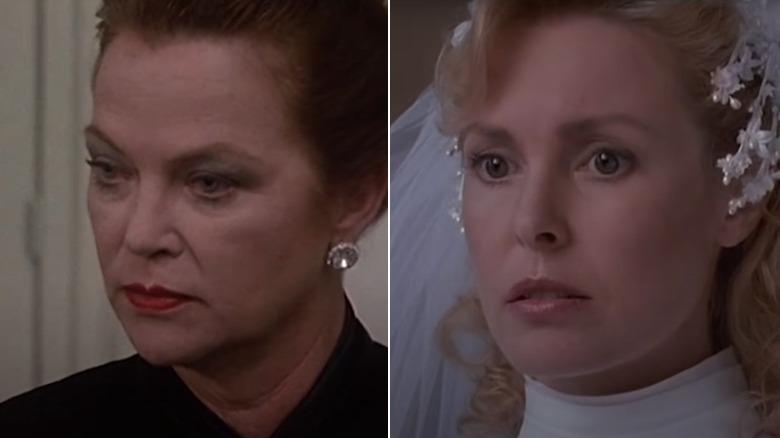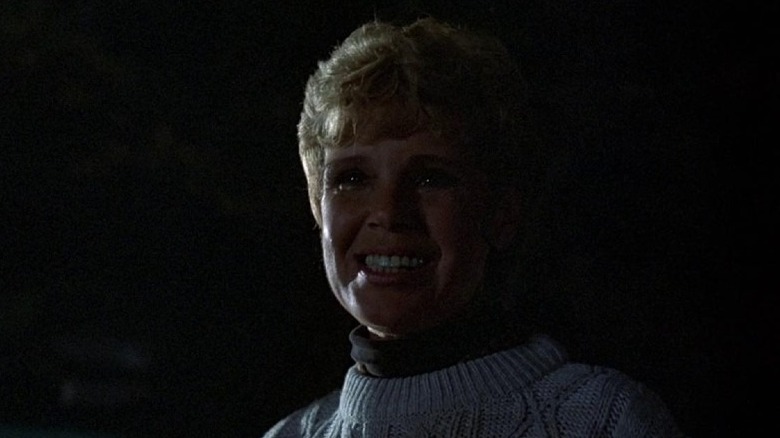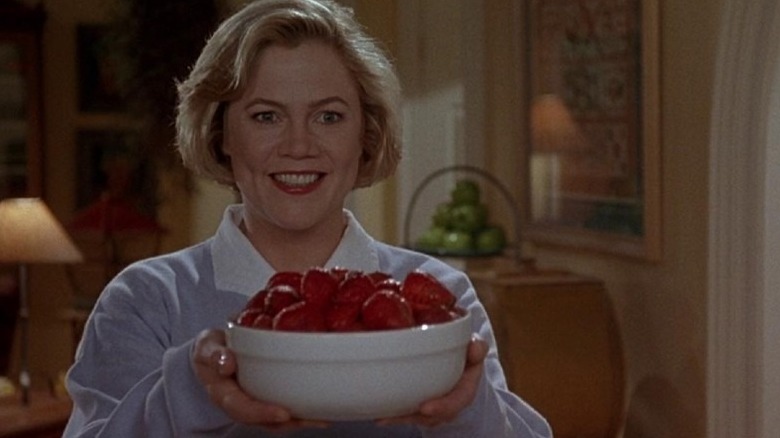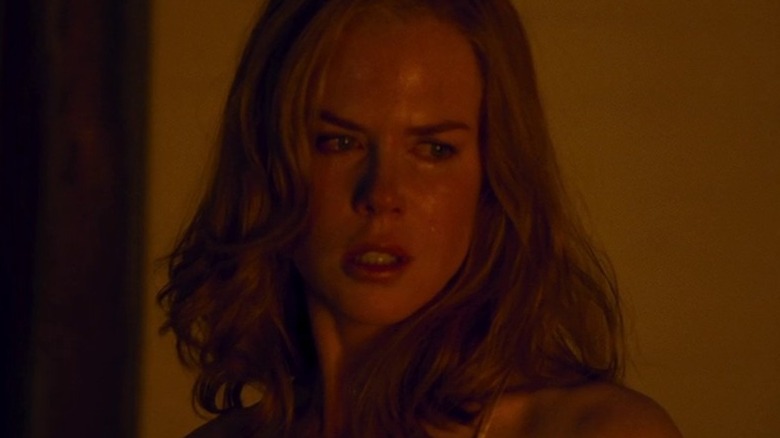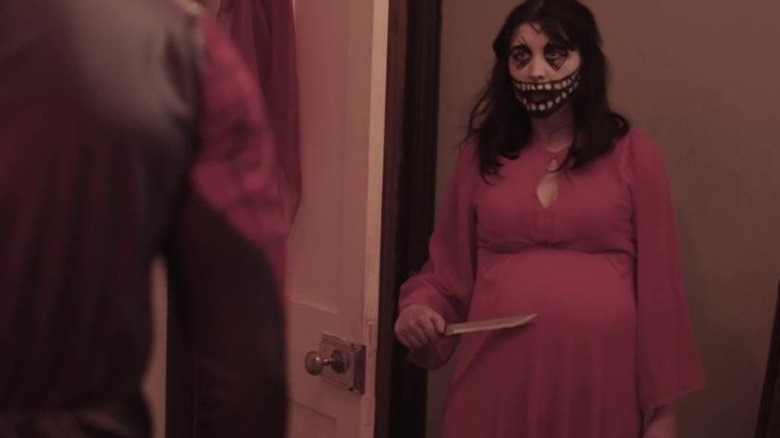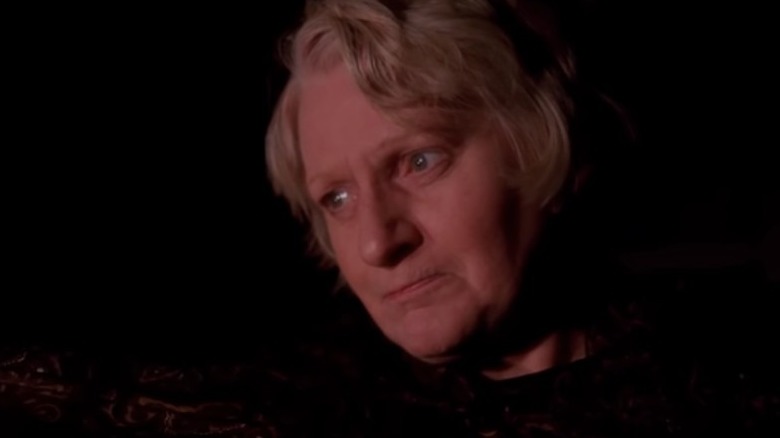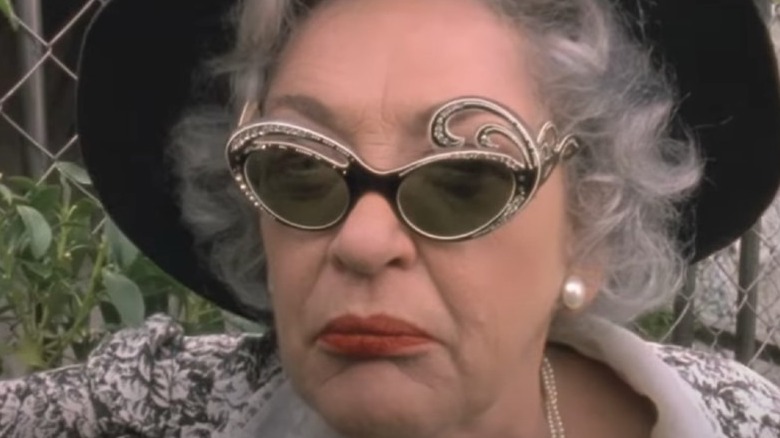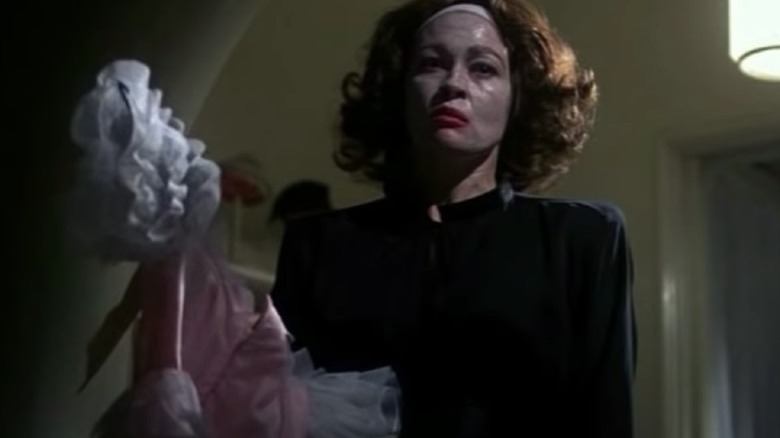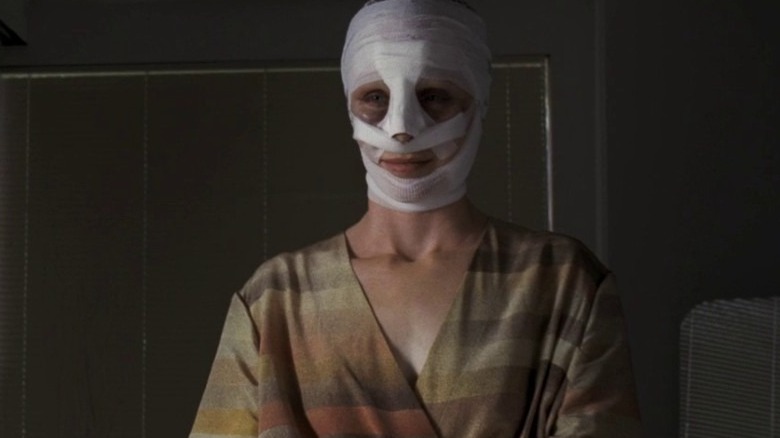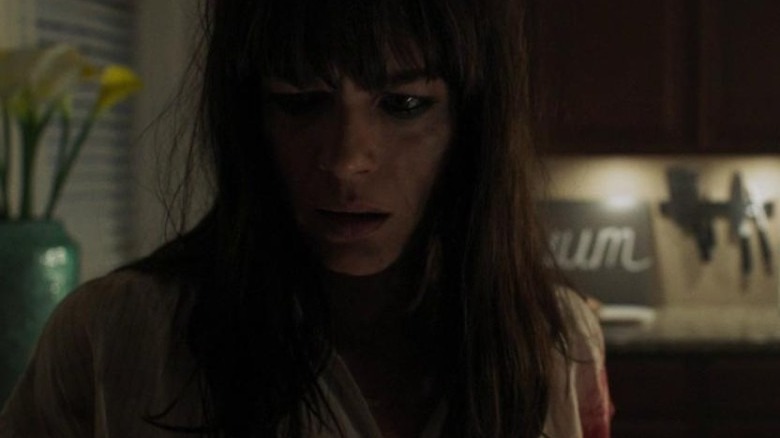Horror Movie Mothers That Are Pure Terror
Motherhood is hard. It's even harder within the framework of a horror film. Women contend with not only new pressures of caring for a child, but perhaps they have yet to process long-buried traumas or addressed mental health issues. As a result, mothers birth their unique brand of terror upon the world. Their children and loved ones must then confront a special fear they never knew existed.
While horror has given us such frightening titans as Michael Myers and Jason Voorhees, those slasher films are all play acting. What is most terrifying are everyday housewives, caregivers, and the elderly who just snap one day and pile up bodies in their bloodthirsty wake. Looking back through cinematic history, we attempted to narrow down to the top 15 most terrifying mothers in horror, ranging from a very pregnant woman with a hunger for blood to a deranged lunatic attempting to keep the status quo. They say mother knows best — well, we're about to prove that notion is dead wrong. Literally.
Nola from The Brood
There's nothing as terrifying as a mother's love. Well, sort of. In David Cronenberg's 1979 film "The Brood," one of his strangest offerings, a mother named Nola (Samantha Eggar) comes under strict psycho-therapy for an undisclosed condition. Her husband Frank (Art Hindle) struggles with raising their daughter Candice (Cindy Hinds) and understanding doctor Hal Raglan's (Oliver Reed) approach to treatment.
After discovering bruises and cuts on his daughter, Frank first confronts Dr. Hal and then goes to his attorney to express concerns over whether Nola has a right to see Candice any longer. "The law believes in motherhood," the lawyer says. Therein lies the thematic crux of the film, demonstrated through a series of killings by deformed creatures disguised as children.
In a similar fashion to 1976's "Carrie," Nola's rage feeds her, quite literally, and her nurturing these vengeful beings is a way to find agency. The little monsters are certainly frightening on their own, but it isn't until the finale that the audience glimpses deep into Nola's mind — and it's bone chilling.
Lucy from Strait-Jacket
Joan Crawford delivers a textbook unhinged performance as Lucy Harbin in 1964's "Strait-Jacket," directed by William Castle. The gruesome opening scene sets the stage: Lucy returns home early from a trip to discover her husband in bed with a mistress and takes an axe to their sleeping bodies. Lucy is committed to a mental asylum for 20 years for those murders, and her daughter Carol (Diane Baker), who bore witness to the slayings, attempts a normal life.
When Lucy is finally released, Carol welcomes her home to the family farm with open arms. Lucy's brother Bill and his wife are skeptical that she is able to cope with modern life, but they are willing to give her a chance. Since her childhood, Carol has turned to sculpting as a way to address her trauma and has seemingly managed to make a good life. She is expected to marry a dashing young gentleman named Michael (John Anthony Hayes), but familial tensions derail the nuptials for the time being.
It appears Lucy has completely recovered from her psychotic break, yet a series of murders in and around the farm tell a different story. "Strait-Jacket" is a gripping horror-drama about generational trauma, mental health, and suffocating pressures put upon women. Crawford and Baker both dish up performances to die for (literally).
Mother from Mother's Day
Bearing a similar tone and style to Wes Craven's "The Last House on the Left," "Mother's Day" explores the ravages of assault and how a matriacial figure provokes her offspring to do her most deranged bidding. Directed by Charles Kaufman, the 1980 film mixes in elements of camp and satire to instill a message that perhaps mother doesn't actually know best.
When three young women go camping, their path takes them right into the center of an ungodly storm. They are attacked, assaulted, and tortured, and only their will to survive can save them. Beatrice Pons gives the titular character a sharp madness, often so over-the-top it bowls you over — and that's the point.
Throughout the film, her sons begin questioning their mother's intentions, as well as the revelation that her forgotten sister, Queenie, still hunts and lurks in the woods surrounding the property. This dynamic offers a compelling contrast to the overarching analysis of aggression upon women and complicity within a violent system.
Ms. Robeson from The People Under the Stairs
Wes Craven tackled issues of poverty, classism, and racism in his 1991 film, "The People Under the Stairs." Wendy Robie and Everett McGill play "Mommy" and "Daddy," respectively, two delusional and unstable property owners, who are not actually married. They are siblings, and the incest overtones add a peculiar layer to the story.
With plans to evict an entire apartment building, Mommy and Daddy contend with Pointdexter (Brandon Quintin Adams), Leroy (Ving Rhames), and associate Spenser (Jeremy Roberts) after they break into their residence. It's soon discovered they have a meek, abused daughter Alice (A.J. Langer) and a horde of discarded children inside the walls and basement.
The viewer is given a front row seat to mayhem and dysfunction. Mommy's most terrifying moments occur around her abusing Alice, most notably the bathtub scene as she tosses Alice into boiling water. Later, after Pointdexter helps free the children, Mommy lunges at Alice with a kitchen knife despite already being injured 一 and it's what nightmares truly are made of. Mommy gives Margaret White from "Carrie" a run for her money.
Margaret White from Carrie
Speaking of Margaret White, Piper Laurie's performance in "Carrie" (1976) perfected the terrifying mom archetype. Stricken with religious fanaticism, she dumps her beliefs about womanhood onto her daughter Carrie (Sissy Spacek) and fails to guide and nurture her as she blossoms into a young woman. The psychological and emotional manipulation Carrie endures is enough to send anyone over the edge, and it's only through her growing telekinetic powers that she is able to find her own strength.
When Carrie comes home from school one afternoon, she confesses to her mother that she had her period. "Why didn't you tell me, mama?!" she pleads. But she is only met with violence and scrutiny. Margaret forces her to recite back various biblical passages before dragging her, kicking and screaming, into a locked closet in which Carrie must repent and beg for forgiveness.
These deeply intimate moments are interspersed throughout the film, woven into the larger theme about adolescence, shame, and bullying. Following the blood-soaked climax, a wild-eyed Carrie slowly treks back home to wash away the night's events. Her mother finally reveals her first sexual encounter and the self-loathing she felt, moments later stabbing Carrie in the back. Fortunately, Carrie is able to return the favor before she succumbs to her fatal injury. "Carrie" is as much about a young girl's bodily understanding and autonomy as it is a mother's clouded, dangerous judgments.
Olivia & Corrine from Flowers in the Attic
Jeffrey Bloom's 1987 psychological thriller "Flowers in the Attic" gives viewers a double dose of terrifying. After her husband tragically dies, Corrine (Victoria Tennant) moves her children Chris (Jeb Stuart Adams), Cathy (Kristy Swanson), Cory (Ben Ganger), and Carrie (Lindsay Parker) into the lavish estate of her estranged parents. Desperate and down on her luck, Corinne hatches a plan to regain her father's love and be reinstated into his will.
Corrine's mother Olivia (Louise Fletcher) is a mean one; an austere woman entrenched in radical Christianity. As such, she forces the children into a life of solitude by locking them away in a bedroom with their only views of the outside world through bars on the window. At the urging of their mother, they steal away into the dusty attic, as both a haven and a prison. Corrine promises that as soon as their grandfather dies, and she inherits the property, she will come get them.
Sadly, that's a lie. Where Olivia is outright evil from the start, Corrine devolves in habit and behavior, quickly abandoning her children completely. Olivia laces cookies with arsenic and even starves them for an entire week, so as to psychologically cripple them further. Eventually, it's all up to Christopher and Cathy to find a way out before it's too late. "Flowers in the Attic" is a moving story about generational trauma, greed, and humanity at its most troubling.
Pamela Voorhees from Friday the 13th
Pamela Voorhees (Betsy Palmer) may be the greatest mastermind of them all. Reeling from the supposed tragic drowning of her son Jason Voorhees, Pamela stalks and murders camp counselors, even those not responsible. Her vengeance courses in her blood, and she's unafraid to play every trick in the book to lure them to their deaths.
In the original "Friday the 13th" (1980), directed by Sean S. Cunningham, Pamela has the upper-hand and uses surprise attacks to her advantage. From appearing out of the shadows to pretending to be a child crying in the rain, she is a cunning and diabolic mother whose love for her son is her most useful weapon. Throughout the film, the viewer is none the wiser on the identity of the serial killer, and in the finale, Palmer delivers one of the most unsettling monologues in horror history. She pours out her heart to the lone survivor Alice (Adrienne King), regaling her sorrow and thirst for revenge. It's one of those performances that is wonderfully subtle in how unhinged it is.
Beverly Sutphin from Serial Mom
On the opposite extreme, there's nothing subtle about Kathleen Turner's wound-up performance as Beverly Sutphin in "Serial Mom." The 1994 film, directed by John Waters, follows a suburban housewife who will stop at nothing to make sure nobody messes with her perfect American life.
If someone crosses her family, Beverly exacts some form of revenge. When her neighbor steals a parking spot at Joann Fabrics, Beverly starts making vulgar prank calls 一 and that's only the beginning. Later, her son's teacher criticizes his fascination with horror films, and, well, she runs him over with her car and leaves him for dead. It all quickly escalates from there, with more bodies piling up. Beverley is eventually caught and becomes a national tabloid sensation — and she totally owns her new-found fame.
As disturbed as she is, Beverly Sutphin is a camp icon. Turner is able to make the switch from bubbly housewife to maniac on the turn of a dime. She makes the most terrifying killer; you can never expect which personality you'll get. Either way, she'll make you rue the day you crossed her.
Evelyn from Stoker
Terror is not always loud. It's sometimes quiet and insidious. It may not manifest in bombastic violence and bloodshed, but you can always feel trouble brewing in the air. In Park Chan-wook's 2013 psycho-drama "Stoker," Nicole Kidman plays Evelyn Stoker, a cold and distant woman who endures the death of her husband and harbors resentment for her daughter India (Mia Wasikowska).
Soon after her husband's funeral, his long-lost brother Charles (Matthew Goode) pays a visit. Through her grief, Evelyn struggles to cope and finds herself hypnotically drawn to Charles. Her already-frigid detachment from India only grows as the film unfurls. India is at first skeptical of her uncle's arrival but is drawn into his web, as well.
The film threads family trauma, dysfunction, and soul-crushing sadness with murderous appetite. Evelyn is a dark, twisted, and subdued sort of storm, only fed by her swelling resentment and envy. She delights in her misery and the inevitable notion that life will one day "tear you apart," she seethes to India in a brief, yet still epic, third act monologue. With Evelyn casting her toxicity squarely on her daughter's shoulders, it spreads like poisoned roots 一 from which India can not escape. She can only embrace it.
Ruth from Prevenge
Grief and pressures of impending motherhood come to a boil in "Prevenge," directed by Alice Lowe, who also stars as a very pregnant Ruth. With the recent death of her husband in a climbing accident, Ruth gets caught in a whirlwind of emotions and a plot for revenge. She believes her husband's accident was nothing short of manslaughter, so she turns to calculated revenge for those involved. But it's a bit more complicated than that. She is provoked by her unborn child 一 as the viewer, we even hear a strange, high-pitched voice guiding and coercing her.
The vengeful scheme leaves the inevitable trail of bodies, each grisly murder as nauseating as the last. Driven to kill, Ruth acts on motherly instinct to protect her daughter, as well as to find some sort of salve to her grief-addled heart. Nothing can bring her husband back, of course. Whenever she wavers in killing someone, her daughter threatens to end her life. Lowe's performance swings like a pendulum between sad and sadistic, and in both instances, Ruth is downright terrifying. Real human emotion gives the role further weight you don't quite see in many of these selections.
Dorothy from Frightmare
Pete Walker's 1974 proto-slasher "Frightmare" testifies to the complete ineptitude of the healthcare system in regards to mental health treatment. Dorothy (Sheila Keith) and her husband Edmund (Rupert Davies) are locked away in a mental institute for the tragic slaying of six people. Years later, they are finally released on their own recognizance, as health officials believe them both to be cured.
That is simply unfounded, unfortunately. Upon their release, Dorothy turns to advertising tarot readings on their farm as a way to "help people" — or so she claims. However, it's just a ploy to lure unsuspecting city folk to their demise. Edmund is at first unaware of what she is doing but catches on soon enough. Meanwhile, it is revealed that the elderly couple has two daughters, Debbie (Kim Butcher) and Jackie (Deborah Fairfax). Since their release, Jackie has been helping Edmund by bringing cuts of meat to convince Dorothy she is killing (but without her actually murdering anyone).
They have the best of intentions, but the execution of deceit leaves much to be desired. It triggers Dorothy's bloodlust and sends her careening for destruction. Dorothy is a tragic figure and victim herself. Her mental illness causes her to do the most unspeakable things, and if the healthcare system had done its job, no one would be dead. Really, she's a terrifying anti-hero.
Vera from Dead Alive
In Peter Jackson's 1992 horror/comedy "Dead Alive," Vera Cosgrove (Elizabeth Moody) wants what is best for her son Lionel (Timothy Balme). The drowning of his father when he was a child has left an indelible mark on him, so he will do anything to please Vera in return. One afternoon, Lionel traipses off to the local zoo with the object of his affection, a shopkeeper's daughter named Paquita (Diana Peñalver). Vera follows and gets bitten by a rabid rat-monkey recently shipped from Skull Island.
Over the coming days, Vera's health severely declines, and she eventually transforms into a puss-oozing zombie. The apocalyptic outbreak is unconquerable, as Vera goes on a rampage throughout the small town. In many regards, it's a clear cut metaphor for motherhood and the lengths one will go to prove unconditional, undying love. It also helps that the gore and practical effects are so stomach-churning you may need a bucket while you watch.
Joan Crawford from Mommie Dearest
The 1981 biopic "Mommie Dearest," directed by Frank Perry, is loosely based on a 1978 memoir penned by Christina Crawford, the adoptive daughter to Joan Crawford. In the book, Christina revealed she endured traumatic physical and emotional abuse, and Perry brings these allegations to light with the sharpness of an anvil. That doesn't detract from Faye Dunaway's manic, bombastic performance, however, as many moments, including the infamous "no wire hangers" monologue, are downright frightening.
Feeling listless, Joan longs to have a baby of her own and decides to adopt, enlisting Greg Savitt (Steve Forrest) to help her out. She succeeds in adopting a newborn named Christina, and it appears she has it all. In the ensuing years, as her career stalls out, her parenting and relationship with her daughter collapses.
Throughout the film, Joan's unresolved personal issues, and perhaps some trauma, spills over into how she cares for Christina. As a result, Joan torments her with psychological ploys for attention, gaslighting, and emotional manipulation. When she discovers a wire hanger in her daughter's closet, she throws a tantrum and then forces Christina to deep clean the bathroom. It's one of several scenes in which Joan transforms into a literal monster. There's nothing scarier than real life (or events inspired by real life, that is).
If you or someone you know may be the victim of child abuse, please contact the Childhelp National Child Abuse Hotline at 1-800-4-A-Child (1-800-422-4453) or contact their live chat services.
Mother from Goodnight Mommy
"Goodnight Mommy," co-directed by screenwriters Veronika Franz and Severin Fiala, flips the terrifying mother archetype on its head. Without diving into spoilers here, the 2014 psychological thriller toys with perceptions of reality in a stark, profound way. After having intense surgery, a young woman (Susanne Wuest) arrives home to her two children Elias (Elias Schwarz) and Lukas (Lukas Schwarz). They welcome her home with warmth and hugs, but as time goes on, they begin to suspect the bandaged-up woman is not their real mother.
The boys are forbidden to open the blinds and are forced to play only outdoors. Mother needs her rest. But things get stranger from there. Elias and Lukas eventually tie up the woman and plead with her to reveal her true identity or prove that she is who she claims. Their tests are all for nought, inevitably crescendoing into quite a fiery end.
"Goodnight Mommy" explores not only the terrifying uncertainty of motherhood but how trauma can forever change a person. It's tense, unsettling, and guaranteed to crawl under the skin, especially Wuest's sturdy performance.
Kendall from Mom and Dad
If there's ever been an argument against families, it is undoubtedly Brian Taylor's 2017 horror/comedy "Mom and Dad." Selma Blair plays Kendall opposite Nicholas Cage as her husband Brent. Together, they are caring parents just trying to understand their rebellious teenagers Carly (Anne Winters) and Josh (Zackary Arthur), who could benefit from stricter discipline.
When a radio signal radiates a mysterious static noise, all parents go into mass hysteria and try to kill their children. While using every manner of weapon, Kendall and Brent bond over their new bloodlust and rekindle their passion. Talk about taking a trust exercise to the next level!
"Mom and Dad" captures the tug-of-war that often rages between children and parental figures. It can be frustrating, exhausting, and thankless 一 and sometimes you just want to smack your kids (or kill them in horrific ways). Taylor offers up a thunderous commentary on modern parenting without skimping on real issues of love and misunderstanding.
